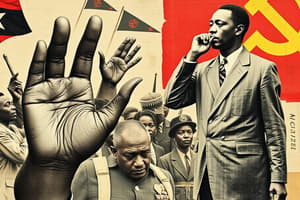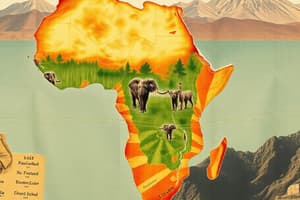Podcast
Questions and Answers
What is one key role of ideologies in African politics?
What is one key role of ideologies in African politics?
- They shape political culture and social behaviour. (correct)
- They dictate military strategies.
- They limit government participation.
- They create economic policies.
How do ideologies relate to the concept of Utopia in African politics?
How do ideologies relate to the concept of Utopia in African politics?
- They emphasize the importance of tradition over progress.
- They seek to maintain existing power structures.
- They reject the idea of an ideal society.
- They present a vision of a better future compared to current conditions. (correct)
What is a common feature of ideologies in political parties in Africa?
What is a common feature of ideologies in political parties in Africa?
- They emphasize individualism over collectivism.
- They provide a platform for political leaders to express their vision. (correct)
- They are rarely discussed within the parties.
- They entirely focus on economic issues.
According to the definition provided, how many components are recognized in ideologies?
According to the definition provided, how many components are recognized in ideologies?
What main ideological victory does Fukuyama discuss?
What main ideological victory does Fukuyama discuss?
What is suggested as a crucial aspect of ideology in the political context?
What is suggested as a crucial aspect of ideology in the political context?
What did the expected victory of capitalism in Africa lead to?
What did the expected victory of capitalism in Africa lead to?
What is necessary for attaining a Utopia according to an ideology?
What is necessary for attaining a Utopia according to an ideology?
Which term describes the analytical tools used to assess roles and interests in African politics?
Which term describes the analytical tools used to assess roles and interests in African politics?
What was nationalism's role prior to African independence?
What was nationalism's role prior to African independence?
What does ideology provide in terms of political interpretation?
What does ideology provide in terms of political interpretation?
What new challenges emerged in Africa after independence relating to ideology?
What new challenges emerged in Africa after independence relating to ideology?
Which of the following best describes the relationship between ideologies and political decisions in Africa?
Which of the following best describes the relationship between ideologies and political decisions in Africa?
Which aspect of politics does the study unit suggest has diminished relevance in Africa today?
Which aspect of politics does the study unit suggest has diminished relevance in Africa today?
What was Kwame Nkrumah's main call to action for colonial subjects?
What was Kwame Nkrumah's main call to action for colonial subjects?
What does the content imply about the political leaders in Africa today?
What does the content imply about the political leaders in Africa today?
What phenomenon replaced ideological battles in Africa according to the content?
What phenomenon replaced ideological battles in Africa according to the content?
What is one primary goal of Pan-Africanism?
What is one primary goal of Pan-Africanism?
What does the concept of 'nonalignment' signify in Pan-Africanism?
What does the concept of 'nonalignment' signify in Pan-Africanism?
Who is one of the founders of the Negritude movement?
Who is one of the founders of the Negritude movement?
What common theme is central to the Negritude movement?
What common theme is central to the Negritude movement?
What is a significant aspect of Pan-Africanism in the economic context?
What is a significant aspect of Pan-Africanism in the economic context?
In what way is Negritude often described?
In what way is Negritude often described?
Which statement best describes the overarching aim of Pan-Africanism?
Which statement best describes the overarching aim of Pan-Africanism?
What is a notable characteristic of class structures in most African states compared to advanced industrial societies?
What is a notable characteristic of class structures in most African states compared to advanced industrial societies?
Which perspective has primarily influenced the study of class in Africa?
Which perspective has primarily influenced the study of class in Africa?
What does Shivji suggest about the expectation of finding similar class patterns in Africa and Europe?
What does Shivji suggest about the expectation of finding similar class patterns in Africa and Europe?
Why is applying classical Marxian categories to Africa considered problematic?
Why is applying classical Marxian categories to Africa considered problematic?
What argument does Kitching present regarding class analysis in Africa?
What argument does Kitching present regarding class analysis in Africa?
According to Jackson, what is necessary for social classes to have sociological meaning?
According to Jackson, what is necessary for social classes to have sociological meaning?
How do contemporary African classes relate to the world capitalist system, according to the content?
How do contemporary African classes relate to the world capitalist system, according to the content?
Which of the following is not a common misconception about class divisions in Africa?
Which of the following is not a common misconception about class divisions in Africa?
What was the main challenge for the educated 'new men' in Africa under colonial rule?
What was the main challenge for the educated 'new men' in Africa under colonial rule?
How is the ruling elite in Africa commonly described in sociological terms?
How is the ruling elite in Africa commonly described in sociological terms?
What distinguishes West Africa's middle class from that of the rest of Africa?
What distinguishes West Africa's middle class from that of the rest of Africa?
What does Staniland suggest is necessary for a class to be fully recognized in terms of sociological evidence?
What does Staniland suggest is necessary for a class to be fully recognized in terms of sociological evidence?
What is a common view regarding the classes that took over African governments after independence?
What is a common view regarding the classes that took over African governments after independence?
What was not a significant characteristic of the middle class in Africa according to the content?
What was not a significant characteristic of the middle class in Africa according to the content?
What is one reason for the educational achievements of the 'new men' in West Africa?
What is one reason for the educational achievements of the 'new men' in West Africa?
In terms of class fulfillment, what is missing among the political class in most independent African states?
In terms of class fulfillment, what is missing among the political class in most independent African states?
Flashcards are hidden until you start studying
Study Notes
Introduction to Class in Africa
- The concept of "class" in Africa is complex and contested, differing from the traditional Marxist framework (bourgeoisie vs proletariat)
- It is difficult to define and measure class in Africa because of its unique historical and socio-economic context
Challenges in Defining Class
- The historical and social context of Africa means that class structures are different from those found in advanced industrial societies
- Some scholars have tried to apply European-based Marxist categories to Africa, but that's problematic
Different Perspectives on Class in Africa
- Some argue that class is not relevant or fully developed in most African countries due to their unique socio-economic and political evolution
- Others see class as an emerging phenomenon, with the ruling elite and the working class/peasantry showing some similarities in their formation and interests
The Ruling Class in Africa
- The ruling elite in Africa is often described as an "administrative bourgeoisie," "national bourgeoisie," "political class," or "ruling class"
- This group, often educated and with Western lifestyles, holds power and enjoys some degree of prestige
- They are not necessarily hostile to colonial powers and may benefit from neocolonial relationships
Challenges in Applying Traditional Class Frameworks to Africa
- The "middle class" in Africa does not hold the same influence or characteristics as its counterparts in Europe
- There is a lack of clear evidence of a unified class consciousness or shared ideology among the ruling elite or other social groups in Africa
Conclusion
- Class analysis in Africa remains relevant but requires a nuanced approach that accounts for its unique social, historical, and political contexts
- Analyzing class in Africa requires a sociological perspective to understand the formation, interests, and consciousness of different groups
Studying That Suits You
Use AI to generate personalized quizzes and flashcards to suit your learning preferences.




